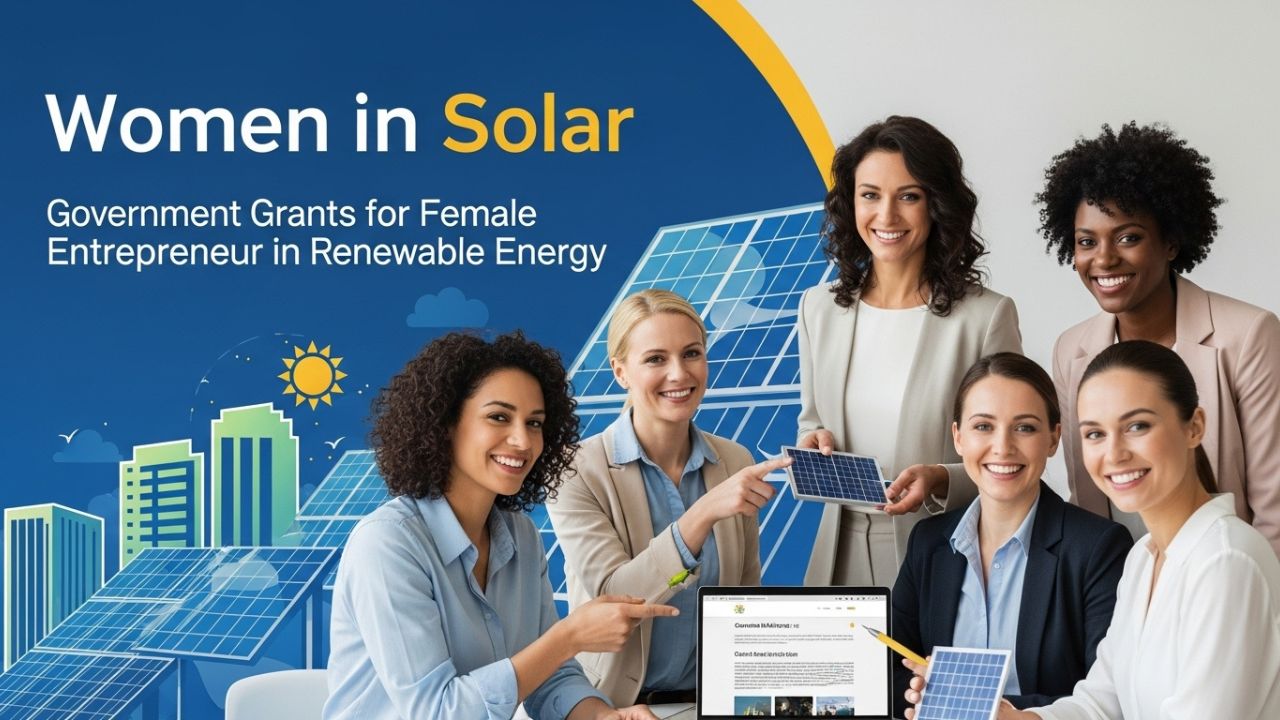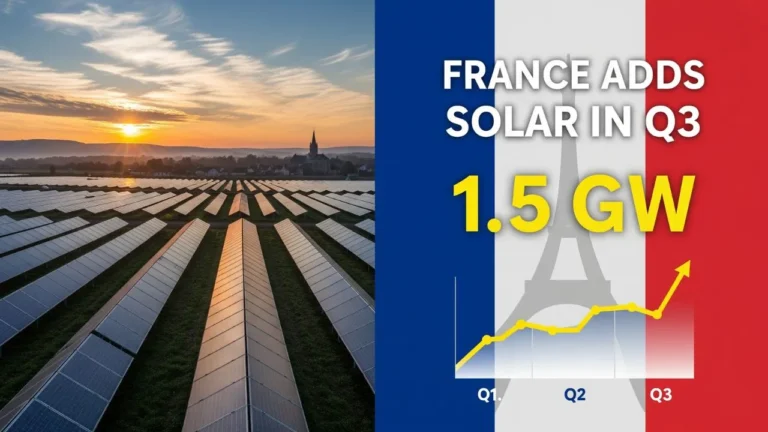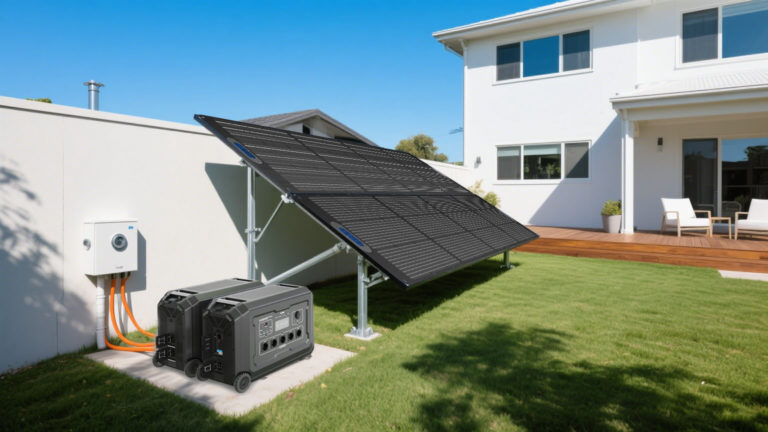Women in Solar: India’s journey toward renewable energy has opened up not just new power sources — but new possibilities for women. Across villages and cities alike, female entrepreneurs are taking the lead in the solar sector — managing installations, financing, training, and manufacturing units. They are not just balancing households; they are balancing grids.
Government-backed initiatives are now recognizing women as essential drivers of this clean energy transformation. Through special grants, training programs, and concessional financing, thousands of rural and urban women are launching solar-powered businesses — from small-scale equipment distribution to large renewable startups.
By 2025, the Ministry of New and Renewable Energy (MNRE), NITI Aayog, and several state governments have actively introduced gender-focused clean energy programs — bridging skill, finance, and opportunity gaps that once limited women’s participation in the energy ecosystem.
The Rise of Women in India’s Renewable Energy Transition
India’s renewable energy target — 500 GW by 2030, with at least 280 GW from solar — is one of the world’s most ambitious. But what makes this transformation truly remarkable is the growing participation of women at every level.
From the deserts of Rajasthan to microgrids in Uttar Pradesh, women are setting up and maintaining solar projects and creating self-reliant business models that power both cities and rural enterprises. Government data shows that by mid-2025, over 1,000 rural women entrepreneurs in Uttar Pradesh alone had installed 4 MW of solar energy capacity under specialized gender-linked programs like DEWEE (Decentralized Renewable Energy for Women’s Economic Empowerment).
These efforts reveal that green energy growth is doubling as a social empowerment revolution — providing income stability, local leadership roles, and climate resilience.
Read Also: How Blockchain and Solar Energy Are Powering India’s Next Clean Energy Revolution in 2025
Key Government Programs Supporting Women in Renewable Energy
1. MNRE’s “Women in Renewable Energy” Initiative
Under the Ministry of New and Renewable Energy, the Women in Renewable Energy (WiRE) initiative focuses on improving women’s participation in leadership, training, and business development in solar and other sustainable energy sub-sectors.
Major features:
- Skill development in solar equipment assembly and maintenance
- Access to concessional loans for small energy enterprises
- Grants for SHG-based solar entrepreneurship models
- Collaboration between MNRE, UN Women, and the International Solar Alliance (ISA) to expand rural inclusion.
This initiative ensures that women can meaningfully engage as installers, technicians, resellers, and micro-entrepreneurs — not just beneficiaries.
2. Decentralized Renewable Energy for Women’s Economic Empowerment (DEWEE) Program
A flagship program in Uttar Pradesh’s rural districts, DEWEE integrates renewable energy with local livelihoods. Supported by MNRE, UPNEDA, and international partners like the Gates Foundation and GEAPP (Global Energy Alliance for People and Planet), this program helps women-run self-help groups (SHGs) to:
- Establish solar-powered businesses
- Access mini-grid energy for micro-enterprises
- Receive training in solar equipment operation and repair
- Gain small-scale funding for village-level enterprises (dairies, flour mills, tailors, and water purifiers)
Over 1,000 women-led SHGs have successfully powered small enterprises using solar installations, collectively delivering over 4 MW of clean energy.
3. Partnership on Women’s Entrepreneurship in Renewables (wPOWER India)
wPOWER, supported by USAID and India’s National Rural Livelihoods Mission (NRLM), focuses on grassroots women entrepreneurs. These “Solar Sakhis” are trained to sell, install, and maintain solar lanterns and clean energy solutions.
Key highlights:
- Over 1,200 trained Solar Sakhis across 10 Indian states
- Over 100,000 households transitioned from kerosene to solar
- Economic empowerment through direct earnings from energy sales
These women contribute simultaneously to energy inclusion and gender resilience, reducing rural energy dependency on fossil fuels.
4. Women Entrepreneurship Platform (WEP) – NITI Aayog
WEP, launched by NITI Aayog, serves as a digital and financial accelerator for female founders in green businesses. It connects women-led startups in renewables with banks, investors, and government investors.
Notable sub-programs:
- “Her&Now Clean Energy Cohort” — offers equity-free seed funding to early-stage women founders
- Training modules in renewable energy innovation and entrepreneurship
- Access to the Women in Clean Tech Fund (2025) with collaboration from Shakti Sustainable Energy Foundation and TERI.
5. Mission Shakti Solar Initiative
Implemented across several Indian states, especially Odisha and Karnataka, Mission Shakti empowers SHGs to undertake solar-powered projects like:
- Rural streetlighting maintenance
- Small-scale solar water pumps
- Community training for domestic lighting systems
This initiative ensures women earn stable incomes as service providers of solar maintenance and installation, particularly under Panchayat-level contracts.
6. Solar Saheli Initiative
Supported by the Rockefeller Foundation, Solar Saheli focuses on training rural women to become local solar entrepreneurs. Participants are trained through structured certification programs on:
- Selling solar lanterns, cookstoves, and portable home systems
- Repair, warranty, and after-sales maintenance
- Partnering with microfinance institutions to supply clean power to low-income homes
This initiative has enabled hundreds of women to earn recurring income while supporting affordable rural electrification.
7. Women in Sustainability (WiS) – CEEW
The Women in Sustainability (WiS) initiative from the Council on Energy, Environment, and Water (CEEW) provides fellowships and leadership programs for women professionals in the energy sector.
WiS also mobilizes policy-level advocacy for gender inclusivity in solar startups and cleantech financing, bridging the network gap between female founders, investors, and policymakers.
8. ReNew Power “Women for Climate” Accelerator
The Women for Climate program by ReNew Power (MNRE-backed) is an accelerator supporting women climate-tech founders across India.
It offers:
- Mentorship with industry experts
- Funding for green startups (₹10–₹25 lakh range)
- Networking that connects founders to major investors in renewable and climate solutions
Women mentors at ReNew Power’s accelerator help emerging solar entrepreneurs navigate policy frameworks, market linkages, and clean-tech compliance.
Financing and Grant Support for Women Entrepreneurs in Solar
1. Government of India Grants
The Government of India supports women in energy through a cluster of MSME-linked and energy-specific grants such as:
- Pradhan Mantri Employment Generation Programme (PMEGP): Provides 25–35% subsidy for solar manufacturing and service startups run by women.
- Energy Efficiency Enterprise Scheme: MNRE-backed financial assistance for small solar product manufacturers.
- MUDRA Loans (Shishu, Kishor, Tarun categories): Collateral-free business loans accessible to women-led solar enterprises up to ₹10 lakh.
2. State-Level Support Programs
Some states are providing exclusive solar entrepreneurship schemes:
- Gujarat: Offers 50% subsidy for women-led solar startups under the Women’s Empowerment in Energy Policy (2025).
- Maharashtra and Rajasthan: Provide grants under the Solar Livelihoods for Women Farmers Program – targeting female farmers seeking solar irrigation pumps or small agrivoltaic projects.
- Kerala: Supports community-level women’s energy co-operatives through solar microgrids with initial MNRE funding assistance.
3. Impact Investment Networks
Modern funding opportunities beyond government subsidies also exist:
- Shakti Sustainable Energy Foundation and TERI’s “Gender in Energy” program support seed capital for 100+ solar startups led by women.
- New Energy Nexus India (2025) invests in up to ₹20 lakh grant funding for women entrepreneurs scaling clean energy solutions.
- USAID’s Women-Led Climate Accelerator (WLCA): Offers $100,000 equity-free seed funding to clean energy ventures managed by women.
Real-World Success Stories
1. UP’s Solar Women Revolution (DEWEE Program)
In Uttar Pradesh, women-led SHGs under the DEWEE initiative transformed agrarian communities by operating solar-run flour mills, tailoring units, and cold storages. These rural “solarpreneurs” earned ₹8,000–₹12,000 per month, while saving on diesel and electricity costs.
2. The Barefoot College Initiative (Rajasthan)
Barefoot College in Tilonia, Rajasthan, continues to train rural grandmothers, known as the “Solar Mamas,” to become skilled solar lamp engineers. These women have electrified more than 50,000 homes across Africa and India, proving that energy literacy transcends age, education, and geography.
3. Solar Sahelis of Rajasthan and MP
Under Rockefeller’s partnership with Frontier Markets, thousands of “Sahelis” distribute solar-powered home systems and lanterns across northern India, directly serving 35 million households, while earning consistent livelihoods.
Training and Capacity Building Initiatives
Skill development is the cornerstone of sustainable empowerment. Several organizations are helping women navigate technical and entrepreneurial challenges:
- Skill Council for Green Jobs (SCGJ): MNRE-affiliated body offering certified courses on solar installation, entrepreneurship, and maintenance targeted toward women participants.
- National Institute for Entrepreneurship and Small Business Development (NIESBUD): Conducts Entrepreneurship Skill Development Programs (ESDPs) on Solar Entrepreneurship with modules combining tech awareness, business management, and market linkages.
- Tata Power Solar’s Dhaaga Program: Provides job placements, toolkits, and mentorship for women in solar installations and operations.
Barriers Still Facing Women in Solar Businesses
Despite the growing progress, certain barriers still persist:
- Access to Credit: Many women lack financial documentation or collateral assets for high-value loans.
- Cultural Limitations: Societal norms in some regions discourage women from taking technical training or traveling for field operations.
- Awareness Gaps: Knowledge about funding opportunities remains limited in rural zones.
- Limited Mentorship: Female-led startups often lack access to expert guidance and investment networks.
- Gender Bias: Women often face challenges when negotiating supplier and installer contracts in the male-dominated energy industry.
The government and NGOs are working together to address these challenges through financing reforms, inclusion mandates, and field-based workshops.
Future Plans: A Gender-Inclusive Renewable India
The outlook for women in the renewable energy revolution is optimistic. According to MNRE projections, over 20% of new green-sector jobs by 2030 will be held by women. Key policy goals moving forward include:
- Scale up micro-solar enterprise models through rural SHGs.
- Expand the Women in Sustainability (WiS) leadership network for policymakers.
- Increase funding access through gender-lens investors.
- Introduce tax incentives for women-led renewable startups.
- Create green skill universities and dedicated incubation centers for women in clean energy innovation.
The MNRE, International Solar Alliance, and UN Women also plan a “Solar Sisterhood Movement” (2025–2027) campaign to educate and recruit more rural women in renewable technologies.
Read Also: The Status of Large-Scale Solar Projects in the UK 2025: Growth, Challenges & Future Outlook
FAQs
1. Which ministry manages women’s renewable energy grants in India?
The Ministry of New and Renewable Energy (MNRE) leads this effort, often with support from NITI Aayog and the Ministry of Women & Child Development.
2. What kind of government grants are available for women in the solar sector?
Grants include solar equipment subsidies, mentorship programs, and funding via the PMEGP scheme, MNRE Solar Entrepreneurship grants, and state-level MSME subsidies.
3. Are loans available without collateral?
Yes. Loans up to ₹10 lakh under MUDRA, and grants under DEWEE and Solar Saheli, are collateral-free.
4. How can women apply for solar entrepreneurship training?
Applications can be submitted through NIESBUD (niesbud.nic.in) and Skill Council for Green Jobs (scgj.in).
5. Can rural self-help groups participate in renewable projects?
Absolutely. Rural SHGs can partner with local DISCOMs or MNRE programs to deploy decentralized solar systems or sell solar home products.
Conclusion
Women are no longer on the sidelines of India’s solar revolution — they are leading it. By merging clean technology with local entrepreneurship, these initiatives are fueling twin transitions: energy independence and gender equality.
From Uttar Pradesh’s 4 MW rural projects to ReNew Power’s climate accelerator in Delhi, women-led solar ventures are reshaping both the economy and societal structures. As government support expands through grants, training, and sustainable finance, the vision for “Empowered Women, Empowered Energy” continues to brighten — one solar panel at a time.




